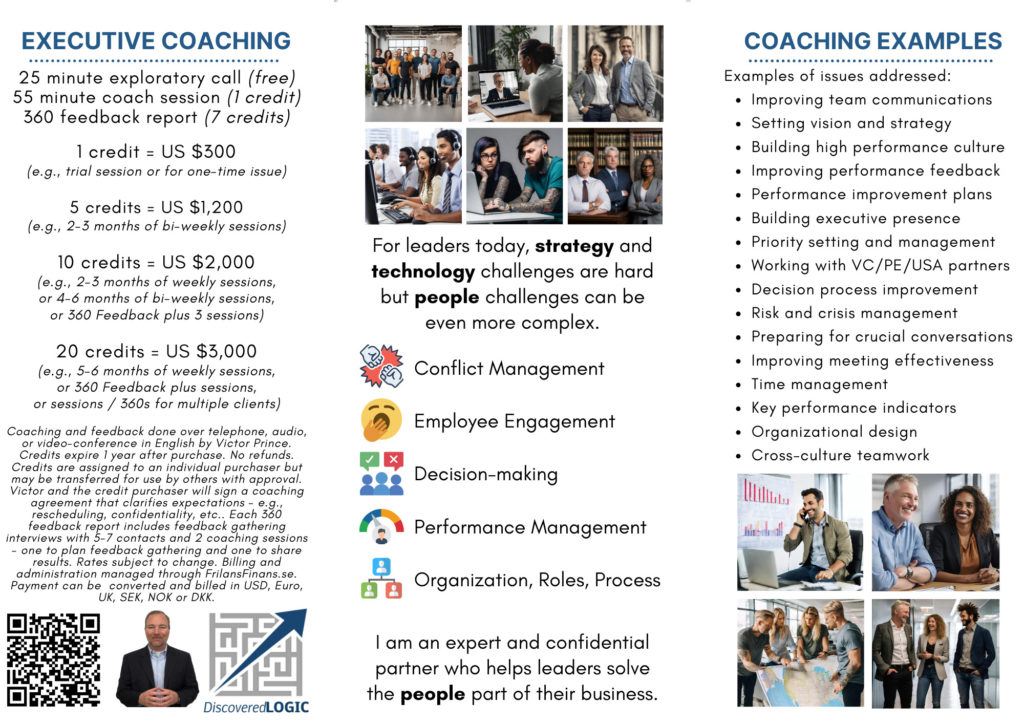Executive Coaching

According to a 2013 survey by Stanford University’s Graduate School of Business, 51 percent of senior executives reported they “receive coaching or leadership advice from outside consultants or coaches.”
Former Google CEO Eric Schmidt said: “Every famous athlete, every famous performer, has somebody who is a coach… The one thing people are never good at is seeing themselves as others see them. A coach really, really helps.”
Former PepsiCo. CEO Indra Nooyi said: “I’m a product of great mentoring, great coaching… Coaches or mentors are very important… If you want to improve the organization, you have to improve yourself and the organization gets pulled up with you.”
Are YOU getting help from a coach to reach your – and your team’s – peak potential?
Meet Victor Prince - Certified Executive Coach
Do YOU want to improve key leadership and career skills like:
- Team Motivation and Conflict Management,
- Communication and Executive Presence,
- Delegation, Prioritization, and Time Management,
- Managing Your Manager and Building Your Network,
- Negotiating and Persuading Others,
- Strategic Thinking and Decision-Making?
Could YOU benefit from confidential coaching from a leadership expert who can help you clarify your challenges, brainstorm your best solutions, and keep you accountable for implementing those improvements?


Victor Prince is a consultant-turned-executive who became an executive coach to help people like you.
As a Chief Operating Officer (COO), Victor led a team with 300+ people and $100+ million of budget.
As a Bain & Company strategy consultant, he advised senior executives across six countries and several industries.
As a best-selling leadership book author, he helps leaders find innovative ways to provide the best leadership to their teams.
As a Wharton MBA, he learned business from the best.
Victor applies proven tools and techniques to help executives identify the root causes of their problems and implement the solutions that will work for them.
How Our Executive Coaching Works
Victor approaches coaching like a consulting project.
He helps clients identify their goals and then employs the right information, tools, and techniques to achieve those goals.
He helps clients track progress and see results.
Victor’s goal is to make the coaching sessions the most valuable, and anticipated, meetings clients have at work.
A typical engagement has Victor meeting with the client every other week for six months. The meetings can be over the phone or via a video call.
Every client is different, but a typical coaching engagement may look like this:
- Gather Baseline Information – Victor interviews the client’s key colleagues to get anonymous feedback on the client’s strengths and opportunities for improvement. The client also takes a few standardized assessments to measure their working interests and style relative to other people.
- Identify Opportunities for Improvement – Victor reviews the feedback and assessment results with the client. They identify and prioritized the most important things to work on.
- Set Improvement Goals – Victor uses a coaching dialog technique called “active inquiry” to help the client identify solutions to their problems and opportunities. Each session ends with the client identifying their biggest insights and specifying a few concrete next steps they want to do before the next meeting.
- Track Progress to Build Accountability – Each session starts by reviewing the progress on the next steps from the previous sessions. Victor shares a web-based tool with the client to help track progress.

